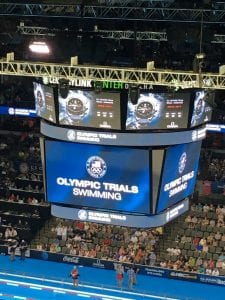You’ve been back in the water for a month or two now. Your entire body is sore and it’s hard to move anything. And now you have to swim a full meet? Forget it, you’re going to do terrible. You’re going to add 10 seconds in all of your events and your strokes are going to be all over the place. What’s the point in even swimming the first meet?
Sound familiar? Yeah, that’s about every club swimmer’s reaction when their over the age of 13 or so. Well here’s what I have to say about that. It’s a load of crap.
You’re not always going to be in peak condition. Even if you taper you might still be sore somewhere. You’re still going to be tight in some areas. Is it worse at the beginning of the season? Sure, but should that stop you from trying? The point of the first meet is to practice racing. No one goes into the first meet thinking they’re going to go a best time unless their time is several seasons old or they swam the event at the first meet last season. Think of the first meet as a checkpoint of sorts. It’s how you and your coach can see where you are at in your training so far and what you need to work on so that when it’s the championship meet you won’t make the same mistakes.
That being said there are ways to help make sure your first meet is successful. Even if the times don’t necessarily matter no one should go thinking it’s okay to add 10 seconds to your 50 free. So what can you do to set yourself up for success before your first meet?
- Spend some quality time stretching. No one loves to do it but it is helpful. If you’re sore, stretching is a good way to help get rid of the soreness faster. You could wait until the body repairs itself, but stretching helps facilitate that repair and speed it along. In general, it’s better to be flexible as flexibility will improve your performance so it’s a good idea to get into a habit of stretching daily but you may require extra stretching if you’re particularly sore.
- Drink a lot of water. Many people think that since you’re a swimmer hydrating isn’t as important. You are in a gigantic hole of water after all. But you still sweat, whether you notice or not. Any swimmer will tell you that there’s not a lot of time during swim practice to drink water. During most sets, you’re lucky to get 15 seconds on that wall and at that point you’re probably focused more on breathing than drinking, which takes time away from breathing. However, the body needs water to help replenish resources and stay in good condition. During practice drink water when you can and carry a water bottle around during the day. I like to carry around a Hydroflask because it keeps water cold even in a hot pool and it’s big enough that I don’t have to refill it all the time but small enough that it’s not a pain to carry around in my bag.
- Get yourself in the right mindset. You are not going to race well if you don’t have your thoughts together. Thoughts like “This sucks” and “I’m going to add so much time” are not going to make you go any faster. Instead focus on other aspects of your race. Think about your technique, your racing strategy, and small little goals. You’ll think about your race in a much more positive light if you think about what you can do right instead of what probably going to happen.
- Do some pace in practice. Just because it’s the first meet doesn’t mean you shouldn’t prepare for it at all. Ask your coach if you can do some pace work in the week leading up to the meet. You’ll feel a lot more confident about what you’re going to go if practice some pace. And it’ll also help you get into the right mindset on what you might want to focus on during your race.
- Talk with your coach about expectations. If you’re unsure of what you should expect ask your coach. They are there for a reason. No not worry about looking stupid or inexperienced. What they expect of you depends on where you are in your own training. If they’ve been making a lot of corrections to your technique they may expect for you to focus on your technique and not worry about going fast while they may expect someone else to go as fast as they can without focusing on their technique. It all depends on you as a swimmer individually.
Remember, it’s the first meet. You’re not going here:

You’re going somewhere similar to here:

Happy swimming!
I related to the first paragraph so much and it kinda made me miss it. I’m kinda excited to see swim from your point of view